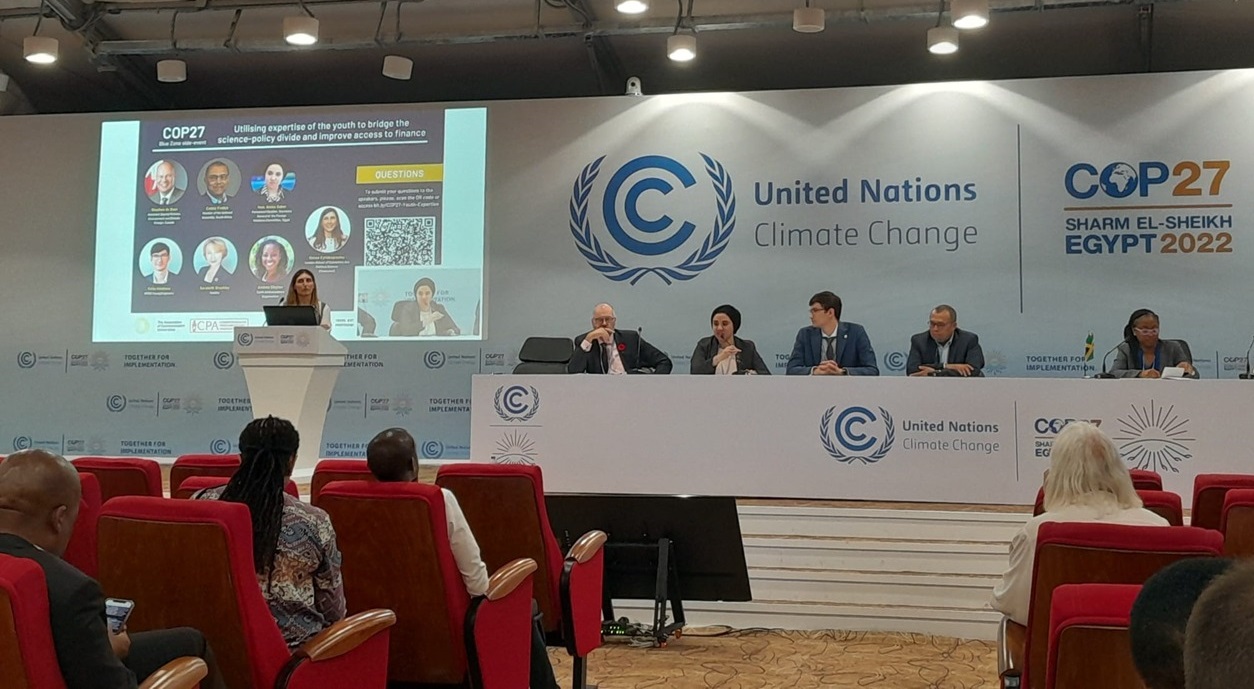
In November this year, COP27 was held in Sharm El Sheikh, Egypt. Representatives of the WFEO Committee on Young Engineers / Future Leaders Working Group for Climate Action (SDG13) were amongst the 35,000 present at the Conference and reflected on its outcomes.
The atmosphere of the annual United Nations Framework Convention on Climate Change (UNFCCC) Conference of the Parties (COP) is something rather unique, being the largest annual gathering of those passionate about climate action and its intersections with other spheres.
COP27 Outcomes
Deemed to be the ‘Implementation COP’, there was pressure on the COP Presidency to make headway with a number of high-profile agendas, including addressing the fact that the Nationally Determined Contributions (NDCs) committed to by October were tracking towards a 2.5°C temperature rise by 2100 rather than the 1.5°C Paris Agreement goal. With the excitement and adrenaline of the first week gradually giving way to the weight of negotiations over the second week, the significance of decisions to be made became even clearer. COP27 made progress on the implementation of technical and financial assistance for Loss and Damage, brought the youth’s voice to the forefront and solidified the interdependency of our systems (including food, water, energy and health). However, many outcomes fell short of expectations; including cover text wording on fossil fuels, mitigation programs, and adaptation finance. Commitments made this and last year are not enough to achieve the 45% reduction in emissions we need by 2030 to limit global warming to well below 2°C, raising questions on the effectiveness of the conference as well as the willingness of parties to enable the systemic and fundamental changes needed.
As young professionals, we must lead the redirection of financial flows towards sustainable natural and built solutions through our investment and development decisions, while recognising the immense value of collaboration (be it inter- or intra-sector, between governments and non-state actors, or between generations) in the fight against climate change.

Speakers of the WFEO-YEFL Side event at COP27 – “Utilising expertise of the youth to bridge the science-policy divide and improve access to finance” held on 10 November 2022.
Youth at COP27
With the introduction of the first ever Children and Youth Pavilion and official Youth Envoy for the COP President, COP27 promised to be a major milestone for youth participation in climate policymaking. Following the inclusion of youth as official stakeholders in the Action for Climate Empowerment action plan (outlined in article 12 of the 2015 Paris Agreement) agreed at COP27, young people’s voices and opinions will now become more impactful in climate policy design and implementation.
While we are grateful for the platform afforded to us at COP27, a seat at the table does not mean having a voice, especially when the table was never made for us. Our engagement and participation are strictly on the terms defined by each COP Presidency. We need to democratise participation in decision-making and distribute power (not just to youth, but also other vulnerable and marginalised populations) and we will contribute to this by pressing on with building capacity in younger generations – a key aim of our working group. We also continue to engage with decision-makers at all levels to encourage them to consider the meaningful participation of youth in policymaking.
Looking ahead
As we look ahead at the road to COP28 and beyond, all eyes are on the progress of the many agreements and plans previously negotiated, including the outcomes of the first global stock take which will come to a close at COP28. It is clear that there are plenty of actions required to battle against climate change and its intersecting crises and we, as young professionals, have a significant role to play.
For more information:
DEC
2022
